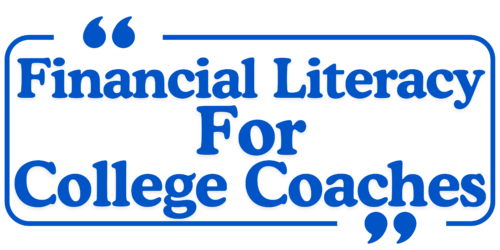Financial Literacy for College Coaches refers to the understanding and application of financial concepts, skills, and knowledge specifically tailored to the unique financial situations and challenges faced by college coaches. This encompasses a broad range of topics designed to empower coaches to make informed financial decisions throughout their careers. Here are key aspects of financial literacy for college coaches:
1. Understanding Contracts and Compensation
- Negotiation Skills: Knowing how to negotiate contracts effectively to secure the best possible compensation and benefits.
- Contractual Clauses: Familiarity with common contract terms, including bonuses, severance packages, and performance incentives.
2. Retirement Planning
- Retirement Options: Understanding retirement plans available to coaches, such as 403(b) or 401(k) plans.
- Long-Term Savings Strategies: Learning how to set aside money for retirement and the importance of starting early.
3. Investment Strategies
- Basic Investment Concepts: Knowledge of stocks, bonds, mutual funds, and other investment vehicles.
- Portfolio Management: Understanding how to diversify investments and assess risk.
4. Budgeting and Cash Flow Management
- Personal Budgeting: Skills for creating and maintaining a budget to track income and expenses.
- Cash Flow Analysis: Understanding how to manage cash flow, especially during fluctuations in coaching income.
5. Tax Literacy
- Tax Responsibilities: Awareness of tax obligations related to coaching income, including self-employment taxes.
- Deductions and Credits: Knowledge of potential tax deductions and credits specific to coaches.
6. Credit Management
- Understanding Credit Scores: Learning how credit scores are calculated and their impact on borrowing.
- Building Good Credit: Strategies for establishing and maintaining good credit.
7. Insurance Literacy
- Types of Insurance: Understanding necessary insurance types, such as health, life, disability, and liability insurance.
- Risk Management: Assessing risks and choosing appropriate coverage.
8. Estate Planning
- Will and Trust Basics: Importance of having a will and understanding trusts for asset protection.
- Beneficiary Designations: Knowing how to designate beneficiaries for accounts and policies.
9. Transition Planning
- Career Transitions: Preparing financially for career changes or retirement from coaching.
- Succession Planning: Understanding how to plan for passing on responsibilities and assets.
10. Family Financial Literacy
- Family Budgeting: Involving family members in financial discussions and planning.
- Financial Education for Children: Teaching children about money management and savings.
11. Emergency Fund Planning
- Building an Emergency Fund: Importance of having savings for unexpected expenses.
- Financial Safety Nets: Understanding how to create and maintain a financial safety net.
12. NIL (Name, Image, Likeness) Considerations
- NIL Regulations: Understanding the implications of NIL for coaches and student-athletes.
- Maximizing NIL Opportunities: Strategies for helping student-athletes navigate NIL contracts and opportunities.
Importance of Financial Literacy for College Coaches
Financial literacy empowers college coaches to make informed decisions about their finances, secure their financial future, and navigate the complexities of coaching contracts and compensation. By developing these skills, coaches can effectively manage their income, plan for retirement, and ensure financial stability for themselves and their families.
